#Carlton Kadell
Explore tagged Tumblr posts
Text
LUCKY PARTNERS
September 25, 1944
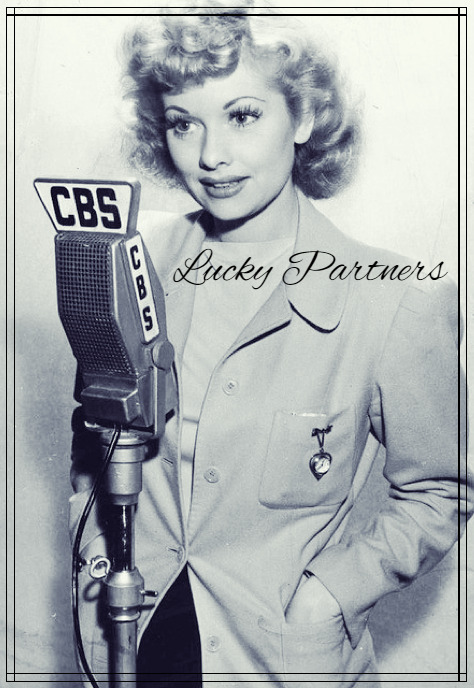
“Lucky Partners” was a presentation of Lux Radio Theatre, broadcast on CBS Radio on September 25, 1944.
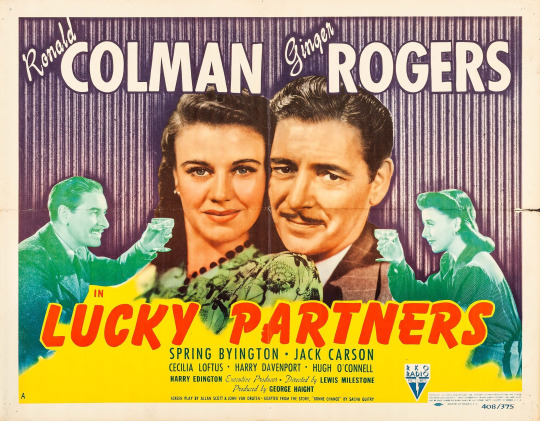
It is based on a 1940 RKO film of the same name directed by Lewis Milestone which in turn was based on the 1935 French film Good Luck. Lucky Partners the movie starred Ronald Colman and Ginger Rogers in their only film together. The radio script was adapted by John Van Druten from the screenplay by Allen Scott.
This is the second radio adaptation of the film. In April 1941 The Screen Guild Theater broadcast a 30 minute radio adaptation with Ginger Rogers reprising her film role. In this adaptation, the role is played by Rogers’ friend Lucille Ball.
Synopsis ~ A man and a woman go partners on a winning sweepstakes ticket. In return for partnering, the man insists they go on a platonic honeymoon, despite the woman’s engagement to another man. When things get more than platonic, the man’s past is exposed and everyone ends up in court.

Lux Radio Theatre (1935-55) was a radio anthology series that adapted Broadway plays during its first two seasons before it began adapting films (”Lux Presents Hollywood”). These hour-long radio programs were performed live before studio audiences in Los Angeles. The series became the most popular dramatic anthology series on radio, broadcast for more than 20 years and continued on television as the Lux Video Theatre through most of the 1950s. The primary sponsor of the show was Unilever through its Lux Soap brand.
CAST
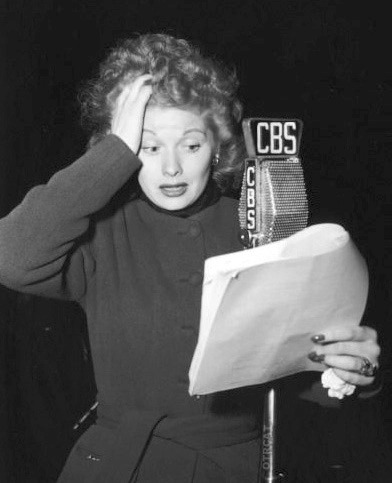
Lucille Ball (Jean Newton) was born on August 6, 1911 in Jamestown, New York. She began her screen career in 1933 and was known in Hollywood as ‘Queen of the B’s’ due to her many appearances in ‘B’ movies. “My Favorite Husband” eventually led to the creation of “I Love Lucy,” a television situation comedy in which she co-starred with her real-life husband, Latin bandleader Desi Arnaz. The program was phenomenally successful, allowing the couple to purchase what was once RKO Studios, re-naming it Desilu. When the show ended in 1960 (in an hour-long format known as “The Lucy-Desi Comedy Hour”) so did Lucy and Desi’s marriage. In 1962, hoping to keep Desilu financially solvent, Lucy returned to the sitcom format with “The Lucy Show,” which lasted six seasons. She followed that with a similar sitcom “Here’s Lucy” co-starring with her real-life children, Lucie and Desi Jr., as well as Gale Gordon, who had joined the cast of “The Lucy Show” during season two. Before her death in 1989, Lucy made one more attempt at a sitcom with “Life With Lucy,” also with Gordon.
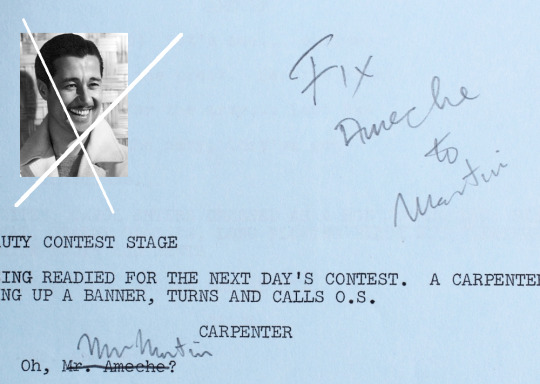
Don Ameche (David Grant aka Paul Knight Somerset) began screen acting in 1935 and was immensely popular with audiences. He had a career resurgence in 1985 when he won an Oscar for Cocoon at age 77. Ameche was supposed to be featured in 1970′s “Lucy Competes With Carol Burnett” (HL S2;E24), but he withdrew and the script was rewritten for Dean Martin, who also withdrew. The role was eventually played by Robert Alda. Consequently, this radio production is the only time Don Ameche acts opposite Lucille Ball. In 1973′s “Lucy’s Tenant” (HL S6;E7) Mary Jane says she remembers seeing a movie starring Mary Astor, Jack Oakie, and Don Ameche but the three stars were never in the same film.

Arthur Q. Bryan appeared with Lucille Ball in Look Who’s Laughing (1941). He is best remembered as the original voice of Elmer Fudd in the Warner Brothers cartoons.He also was an accomplished radio actor appearing for ten seasons as Doc Gamble on “Fibber McGee and Molly.” In 1952′s “Ricky Loses His Voice” (ILL S2;E9) he played Mr. Chambers, new owner of the Tropicana, a former vaudevillian looking to return to the stage.

Verna Felton (Aunt Lucy) made her professional stage debut at the age of 10 as ‘Little Verna Felton,’ working extensively on stage. Felton was one of the most successful performers in radio, and soon went on to television. She played the persistent Mrs. Day on “The Jack Benny Show” (1955). She memorably played Lucy Ricardo’s maid, Mrs. Porter, as well as making one other appearance on “I Love Lucy.” She received two Emmy nominations for her role in the Desilu series “December Bride,” playing Hilda Crocker from 1955 to 1959 opposite Spring Byington, who, coincidentally, was in the original film of Lucky Partners playing the role she assays here, Aunt Lucy!
Carlton Kadell (Frederick ‘Freddy’ Victor Harper III) starred as “Sky King” for ABC radio. He also was heard in the “Tarzan” serials.
Leo Cleary was primarily known as a radio performer, but did two films in 1940 with Lucille Ball: You Can’t Fool Your Wife and Dance, Girl, Dance.
Norman Field began screen acting in 1945, just a few months after this radio program first aired. On radio, he was heard in hundreds of programs, including “Chandu the Magician,” “Mystery is My Hobby” and many installments of “Lux Radio Theatre.”
Noreen Gammill was a radio performer who voiced Catty the Elephant in Walt Disney’s Dumbo. She was later on screen as a background player in “The Andy Griffith Show,” filmed at Desilu Studios.
Leona LeDoux was a radio actor in the 1940s, specializing in children's voices for such shows as, "One Man's Family," "Blondie," and "Baby Snooks." Here, she is part of a live commercial for Lux.
Eddie Marr was born on Valentine’s Day 1900 in Jersey City, New Jersey. In 1938 he was seen with Lucille Ball in The Affairs of Annabel. Along with Lucille Ball, he was in the 1966 TV special “Bob Hope: 15 of My Leading Ladies" playing Joan Caulfield’s chauffeur. He was also with Lucy in “The Bob Hope Show: Bringing Back Vaudeville” in November 1970.
Charles Seel was a former vaudevillian and radio actor who acted in early silent films. Regularly on screen after 1937, he usually played small roles such as clerks, bartenders, and shopkeepers. From 1961 to 1974 Seel was a recurring character on TV’s “Gunsmoke”.
Harry Tyler did four films with Lucille Ball from 1937 to 1950. He appeared in more episodes of “Alfred Hitchcock Presents” than any other actor.
John M. Kennedy (announcer)
ACT ONE

The episode is introduced by producer Cecil B. DeMille, who asks the audience to help pick the play and stars for the show’s tenth anniversary by submitting a postcard. He tells a story about Adolph Menjou in London that acts as a message about Lux Soap.
Our story unfolds in the Greenwich Village neighborhood of New York City with the casual meeting of David, a care-free artist (Ameche) and a girl delivering books (Ball). He wishes her “good luck” and they go their separate ways. The girl, Jean, goes home to tell her Aunt Lucy (Verna Felton) that after a man wished her good luck - she was given an expensive dress that was headed for the trash after a marital squabble.
Jean spies David on the street and rushes out to offer him a business proposition. She asks him to meet her at Nick and Nick’s, a neighborhood bar and grill.
David gets a visit from Wendell, his lawyer and friend who begs him to come back to Chicago, despite his checkered past there.
At Nick and Nick’s Jean buys the last sweepstakes ticket. She is feeling lucky because of the dress and feels David may be her good luck charm. Jean is hoping to win enough money to marry her sweetheart, an insurance salesman named Freddy. David will go in on the ticket with Jean under the proviso that she let him pay for their honeymoon, which he calls “our honeymoon.”
Angry about the “our honeymoon” insult, Jean introduces David to hot-head Freddy, her future husband, who hauls David into the back alley, presumably to avenge his sweetheart’s honor. Instead, however, they return laughing instead of bruised. David has convinced Jean that they will honeymoon as brother and sister and offers that Freddy can tag along. Freddy holds on to the sweepstakes ticket for safekeeping. They have to figure out whether to wager it all on a horse or play it safe for a smaller cut of the winnings. David and Jean listen for the results of the race on the radio. They do not win. Freddy calls and it reveals that he sold her half of the ticket for $6,000 before the race! But he only sold her half, not David’s, who has lost it all. Jean gives David half anyway and David insists on the full terms of the agreement: to take her on a platonic honeymoon. Jean agrees to the ‘experiment’.
End of Act One.
A live commercial for Lux Soap consists of a letter from a consumer, Mrs. Willett, presented by Sally and Mrs. Kennedy.
ACT TWO
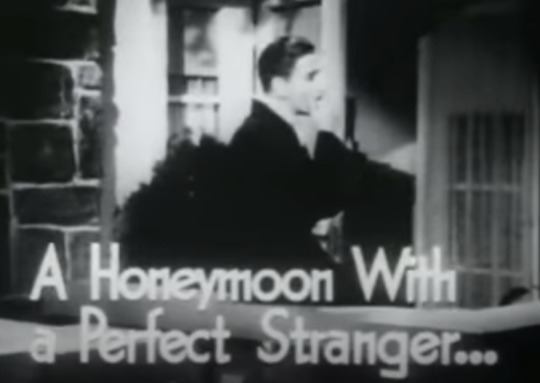
DeMille introduces the second act.
Jean and David are off on their ‘experimental honeymoon’ in a car David bought in her name. Jean wants to stop at a Western Union office to send a wire to Aunt Lucy and Freddy.
They arrive at a hotel in Niagara Falls, honeymoon capital of the world. Checking in as brother and sister, they go to their separate hotel rooms. They have breakfast together. David has sent Jean flowers. The hotel has taken it upon themselves to move them to adjoining rooms! An angry Freddy arrives to check up on his future wife. After finding no hint of misconduct, Freddy agrees to leave but is still not satisfied that everything is on the up-and-up. He checks in at a nearby hotel, asking for a 2am wake-up call.
In the evening, David calls Jean from his bedroom. He asks her to meet him in the hotel lobby and to wear her ‘lucky dress’. An older couple unknown to them asks them to join them on the terrace garden. They lead them to a bridge and the old man asks David to carry her over the bridge and to kiss her. The older couple performed the same ritual 50 years earlier and, thinking Jean and David are a romantic couple, want them to have the same happiness.
Rather than risk any further romance, Jean decides to go to bed. At 2am, Freddy loudly knocks on what he thinks is David’s door, but Jean answers it. They have swapped again so that Jean can have the room with the fireplace. Freddy uses a fire axe to get into David’s room, but he’s nowhere to be found. Freddy calls the front desk and is told David has checked out, but left a note for Jean.
Speeding away from Niagara Falls, a policeman pulls David over, who is driving the car he put in Jean’s name. They go off to find Jean to explain. End of Act Two.
Pause for station identification. During the break DeMille announces that the National Safety Council’s Colonel Stillwell (in New York) is presenting Lever Brothers and the show with an award. [Archival recordings do not present Stillwell’s remarks, just DeMille’s.]
ACT THREE
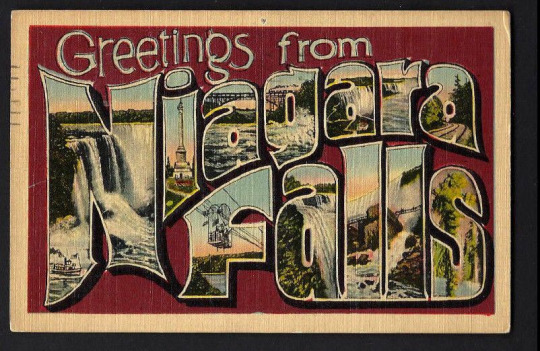
DeMille catches us up that Freddy, David, and Jean are facing a judge in a small town outside Niagara Falls. David reveals that he is really named Paul Knight Somerset. They are put in jail till the judge can make some sense of things.
Next morning, the case is tried. David’s true identity has the town abuzz. David’s lawyer and friend, Wendell is there to represent him, but is dismissed so that David / Paul can represent herself. Aunt Lucy testifies that David gave her an expensive dress and bought the ticket. The hotel clerk testifies that David wanted adjoining rooms for illicit purposes. Freddy testifies that David’s newfound celebrity has changed his view of David. Jean takes the stand and explains the ‘experiment’. She is cross-examined by David, addressing himself as “my client”. The judge asks some questions that make David look like a scandalous womanizer.
David cross-examines himself to clarify his true intentions and feelings for Jean. It turns out that some paintings he published in a book got him sued for libel and was put in jail on principal.
The judge convicts Freddy of being a dope and destroying a hotel door with a fire axe.
The judge acquits Jean for being naïve and too trusting.
The judge is not happy with David’s record and conduct in court. Jean objects to the judge’s comments. The spectators cheer Jean’s defense of David.
The judge makes Jean and David admit that they are in love and throws the case out of court.
David and Jean are driving back to New York. He proposes a new ‘experiment’ involving a gold ring and a local justice of the peace. They are not headed to New York City after all, but to Niagara Falls! End of Play.
CURTAIN CALL
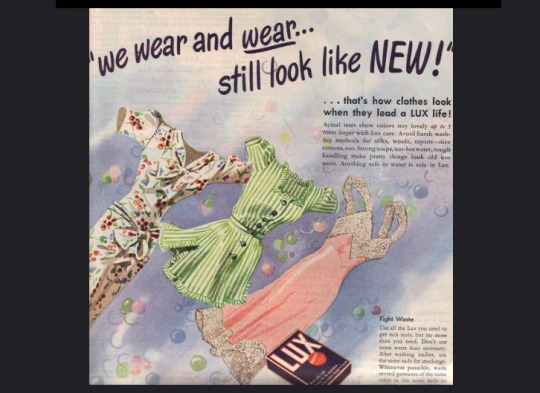
A live commercial for lux involves a little girl and mother hanging laundry on the line.
DeMille returns to talk to Lucille Ball and Don Ameche.

Lucille reveals that Don Ameche is forming his own motion picture company and making the story of Doctor Wassell starring Gary Cooper and Laraine Day. This turns out to be a disguised promotion for the 1944 film The Story of Dr. Wassell, based on the life of real-life Navy Officer, Corydon M. Wassell, directed by DeMille himself.
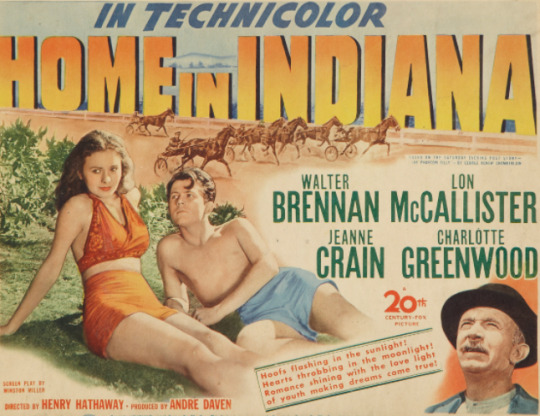
DeMille announces next week’s show will star Walter Brennan, Jeanne Crain, and Charlotte Greenwood recreating their original screen roles in Home in Indiana, a film released in July 1944. The studio audibly audience gasps!
DEMILLE: “Goodnight to you, from Holly-wood!”
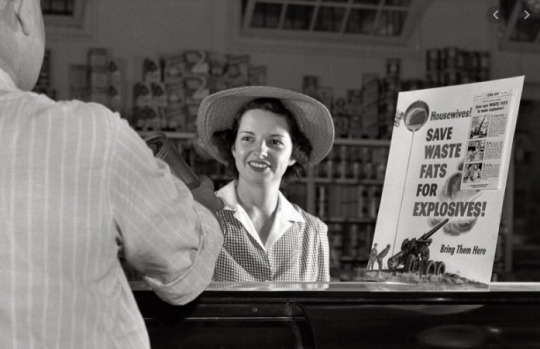
The announcer wraps up by asking consumers to save waste fats and greases to help fight the war. He reminds listeners to send in their postcards suggesting stories and stars for the tenth anniversary broadcast.

"Lucky Partners" was produced through cooperation with RKO, producers of Bride by Mistake.
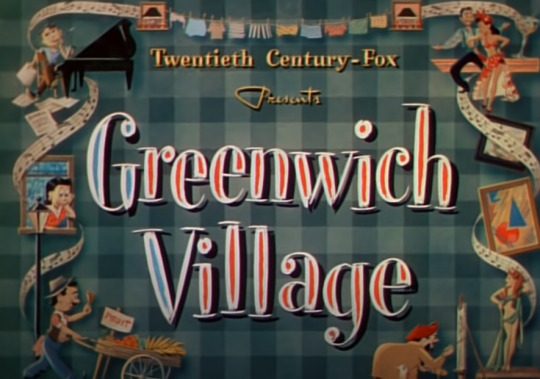
Don Ameche is mentioned as appearing in Greenwich Village, a 20th Century Fox film.

Lucille Ball appeared courtesy of MGM, producers of the Technicolor picture Kismet. Interestingly, Lucille Ball is not promoted as being in the MGM film Meet The People, which had premiered in New York City two weeks earlier and was still in release as of this broadcast.
TRIVIA

The story opens in Greenwich Village, a bastion of bohemian artists and romantics that thrived in the 1940s. It was the setting for My Sister Eileen, a 1938 book that inspired a 1940 play and 1942 film. It also was the setting of Don Ameche’s 1944 film. The above pulp novel was published in 1943.

Acting as his own lawyer, David cross-examines himself in court, something Lucy Carmichael later did in a 1964 episode of “The Lucy Show.”

Honeymoons and Niagara Falls have gone together for nearly two centuries. In a 1964 episode of “The Lucy Show,” Lucy’s daughter wants her mother to think she’s eloping so she leaves out a travel brochure for Niagara Falls!
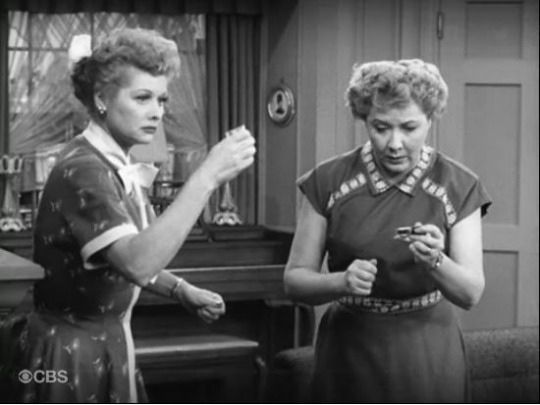
Sweepstakes were the pre-cursor to public lotteries. In the 1950s newspapers offered Lucky Buck contests, asking readers to compare serial numbers published in the newspaper with their own bills. This was the subject of “Bonus Bucks” (ILL S3;E21) in 1954, where like David and Jean, the Ricardos and Mertzes split the winnings - if they can just claim them in time!
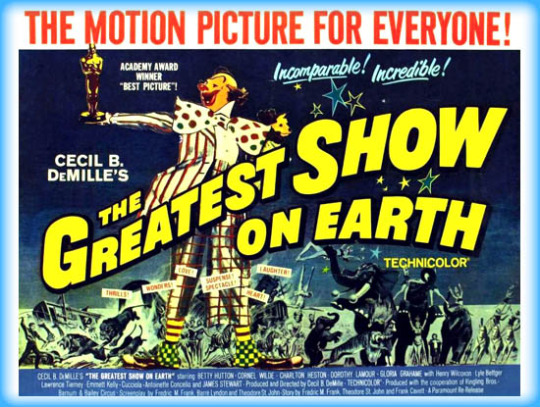
In 1949, Lucille Ball desperately wanted to do Cecil B. DeMille’s The Greatest Show on Earth, but when she asked Columbia’s Harry Cohn to loan her out to MGM, he sadistically cast her in The Magic Carpet, thinking that it was such an awful script that Ball would refuse to do it, then he could suspend her, and refuse to loan her out. Instead, Lucille called his bluff and cheerfully accepted the film, knowing that it was a quickie that would be wrapped by the time The Greatest Show on Earth started filming. Fate intervened and Lucille got pregnant with her daughter Lucie and never got to make the film. It was her husband Desi Arnaz who went into business mode and told Lucy to “grab her $85,000 fee and run.” DeMille is quoted as saying,
“Congratulations Mr. Arnaz, You are the only man to ever fuck his wife, Cecil B. DeMille, Paramount Pictures, and Harry Cohn, all at the same time.”
#Lucky Partners#Lucille Ball#Don Ameche#Lux Radio Theatre#1944#cecil b. Demille#Verna Felton#Greenwich Village#Niagara Falls#Arthur Q. Bryan#Carlton Kadell
0 notes